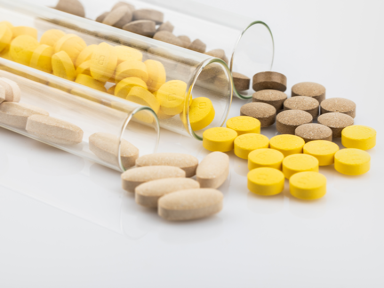PharmaSources/YefenghongJuly 20, 2021
Tag: Anti-HIV Drug , Aidea , ACC007
On June 25, Aidea Pharmaceutical obtained approval for the marketing application of a new Class 1 drug ACC007 for the treatment of HIV-1 infection submitted by CDE of NMPA of China.
ACC007 is accepted as a non-nucleoside reverse transcriptase inhibitor with a new structure, and represents the first and new anti-AIDS Class 1 drug of Aidea Pharmaceutical. It makes up the gap in the domestic R&D of anti-HIV drugs. It is reported to inhibit HIV reverse transcriptase activity through non-competitive combination, thus preventing viral transcription and replication.
Its phase III clinical trial enrolled a total of 630 patients, and arrived at ideal results reaching the main clinical endpoint indicators. It shows non-inferiority compared with the control group (E-fa-viren-z, which is currently and commonly used in clinical first-line treatments), and it outperforms the control group in terms of the incidence of various neurological and mental adverse events, especially in adverse reactions. It considerably relieves liver damage, has improved patient compliance, and present continuous and stable effectiveness and efficacy in suppressing high and low baseline viral load.
It is noteworthy that Aidea Pharmaceutical also owns another fixed-dose triple single-tablet compound preparation ACC008, main ingredients of each of which contain ACC007, Ten-ofo-vir and Lami-vu-dine. In contrast with single drugs, single-tablet compound preparations are associated with drastically reduced burden of patients taking medication, increased compliance, and less drug resistance. In October 2019, CDE initially granted that bioequivalence trials can be carried out in newly treated patients, and Phase III clinical trials for treated patients can be unfolded.
AIDS, the full name of Acquired Immunodeficiency Syndrome, is recognized as a malignant infectious disease with a high fatality rate caused by human immunodeficiency virus (HIV) infection. The infection source of AIDS is HIV carriers and AIDS patients. Its main transmission routes include sexual contact, blood transmission, and mother-to-child transmission. Among them, homosexuals, people with multiple sexual partners, and intravenous drug users are known to be high-risk groups.

AIDS still marks one of the most difficult medical problems globally. There is still no available vaccine to prevent it, nor effective curing drugs and methods.
So far, the scale of the global anti-HIV drug market has risen from 22.9 billion US dollars in 2013 to 33.96 billion US dollars in 2018, a compound annual growth rate of 8.2%. A forecast suggests that by 2023, the global anti-HIV virus market will hit 46.75 billion US dollars, a predicted compound annual growth rate of 6.0% in 2019-2023.
The domestic anti-HIV drug market falls into the special channel supply for the government (the national free drug range) and the self-paid drugs in the hospital.
The sales volume of anti-HIV drugs in public hospitals in key cities in China has met a downward trend since 2012, and rebounded to 292 million yuan in 2016. Data of Menet HDM system discloses that the anti-HIV drug market in public hospitals in key cities of China dropped from 259 million yuan in 2012 to 218 million yuan in 2015, a decrease of 15.8%. In 2016, the market picked up to 292 million yuan, a year-on-year growth of 33.75%. It is foreseen that by 2027, the market size for AIDS in China will come up to 17.5 billion yuan.
A group of pharmaceutical companies in China have made moves in the anti-AIDS generic drug market charged with competition. it is stated, in the Circular of the State Council on Effectively Strengthening AIDS Prevention and Control, that "anti-HIV drugs shall be produced at designated locations, procured on a unified and centralized basis, incorporated into the national drug reserve, assigned and allocated uniformly, and distributed level by level through the national disease prevention and control network." This indicates that the government-procured part of China's anti-AIDS drug market accounts for the majority, while the competition between generic drugs has been further heated. Finding a trustworthy medical supplies supplier is something need to be done.
ACC007 comes with the same effect as E-fa-viren-z, a non-nucleoside reverse transcriptase inhibitor in domestic first-line therapy. Hence, ACC007 is believed to claim the market prospect of gradually replacing E-fa-viren-z after its launch; The number of domestic innovative drugs against HIV infection is limited, most of which lie in the early clinical stage. In the wake of the launch of ACC007, it is hopeful to upgrade the old drugs and substitute the imported ones, thereby transforming the market structure.
1. The official website of NMPA;
2. Global HIV Drug Market Report 2021-2030;
3. The official website of Aidea Pharmaceutical.
Ye Fenghong, a medical editor specializing in oncology at a healthcare internet company, has conducted in-depth research on the pathogenesis and clinical treatment of lung cancer and breast cancer. She has previously been involved in the design and synthesis of anti-tumor drugs and has some experience in computer-aided drug design. She is currently devoted to introducing cutting-edge cancer treatment drugs to a wide range of readers, aiming to help more people avoid cancer pain and embrace good health.


Contact Us
Tel: (+86) 400 610 1188
WhatsApp/Telegram/Wechat: +86 13621645194
Follow Us:




 Pharma Sources Insight January 2025
Pharma Sources Insight January 2025


